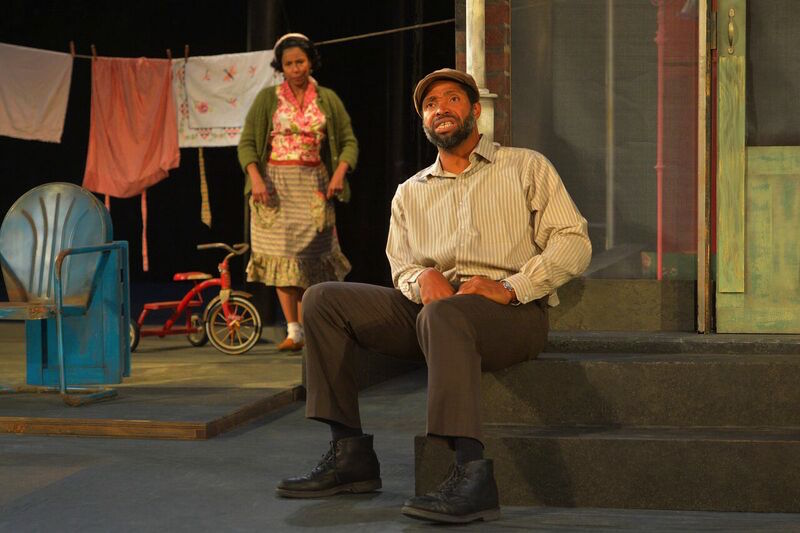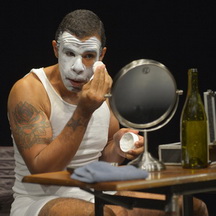
California Shakespeare Theater opened their production of August Wilson’s Fences this past weekend. Part of the Pittsburg Cycle, a series of plays most of which are set in the impoverished urban neighborhood Wilson grew up in, Fences takes place during the 1950s.
The play presents a slice of urban African-American culture in the format of very classical theater, moving forward in a narrative in which characters develop and interact, revealing their inner flaws and strengths. Director Raelle Myrick-Hodges has chosen to present her excellent cast in straightforward, shoot-from-the-hip theater.
The story centers on garbageman, Troy Maxon, played with vigor and balance by Aldo Billingslea. Maxon is the center of a constellation of characters: his two sons, his war-damaged brother (Donald E. Lacy, Jr.), his best buddy Bono, whom he met in jail when both were living out the wildness and desolation of young black men with limited options. And Rose (Margo Hall), his loyal and loving wife.
The first half of the play gives us Maxon’s life and his character through a series of what are basically monologues, for Maxon is a storyteller. Like all storytellers he knows how to embellish, how to hold his audience in thrall, less through an adherence to truth than through an almost mystical self-aggrandizement. In his lively tellings, he battles not only demons, but death itself as he tells of his bout with pneumonia: “Death standin’ there, grinnin’ me.” They battled hand-to-hand for three days and three nights until death fled, defeated.
And the demons? One was “a white guy with a clipboard.” As his buddy Bono (Guiesseppe Jones) comments, “You got Uncle Remus in your blood.”
As engaging and imaginative a storyteller as Troy is and as admirable as he can be, he is not sympathetic. Anger and disappointment stalk his life. He was a baseball talent before Jackie Robinson, confined to the Negro league and unable to gain the money and prestige that national league baseball offered. Threatened by his brutal father, who coveted his adolescent girlfriend, Troy must flee home at the age of 14 when he retaliates with violence. His reckless childhood leads to incarceration, and he spends 15 years in prison.
He recollects these stories in the first act of the play, when he has been married to Rose for 18 years. Not only has she brought him love she has brought him stability. Even so and despite his gains, he is shackled by his own definition of manhood. Manhood is a kind of unhappy responsibility. And the unhappiness it creates he inflicts on all who surround him. Loving his wife and children takes a far distant second to the dreams he had of being a baseball star. His ability to shine has become relegated to his memory and his tall tales.
He insists his youngest boy, Cory (J. Alphonse Nicholson), give up football, just as he gave up baseball. His older son Lyons (Lance Gardner) has made an equally unruly choice; he is a musician. When Cory asks his father why he doesn’t like him, Troy replies, “No law says I have to like you.” Providing food and shelter is the extent of his engagement. And he exhorts his son to get a job, to “become a man.”
The self-absorption he feels entitled to as a man reaches its climax when the affair he has been having with another woman results in pregnancy. Rose is devastated. In a fiery exchange she tells him she too has sacrificed, and continues to sacrifice. He isn’t listening, and the phone call comes that will change their life forever. His lover has died in childbirth, and the baby is now motherless. Rose refuses to make the innocent infant responsible for Troy’s betrayal. She takes in the child to raise as her own.
In this play of male voices, the director has added a soundscape of African-American women telling of their men’s unfaithfulness and their pain in the face of that betrayal. The recordings were made in story gatherings with two Cal Shakes’ community partners, The Allen Temple Arms in East Oakland and the Berkeley Food and Housing Project’s North County Women’s Shelter. Fragments of these discussions were played along with music in the slight pauses between scenes. This excellent idea could have been more emphatically present in the play; the excerpts of these women’s lilting voices joining that of Rose in her generous and loving acceptance.
– Jaime Robles
California Shakespeare Theater’s production of August Wilson’s Fences, directed by Raelle Myrick-Hodges, continues through July 31. For information and tickets, visit calshakes.org.
Photo: Margo Hall as Rose Maxson and Aldo Billingslea as Troy Maxson in California Shakespeare Theater’s production of August Wilson’s Fences, directed by Raelle Myrick-Hodges. Photo by Kevin Berne.
